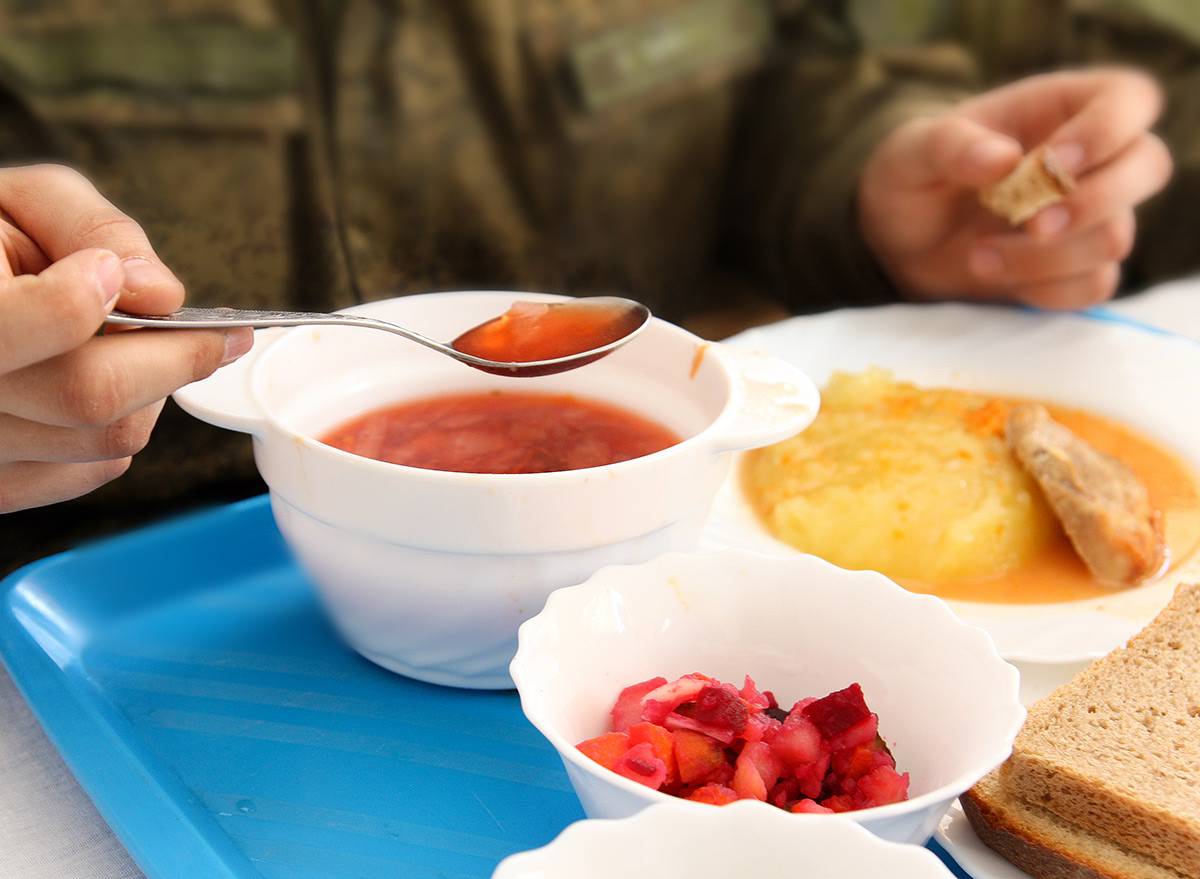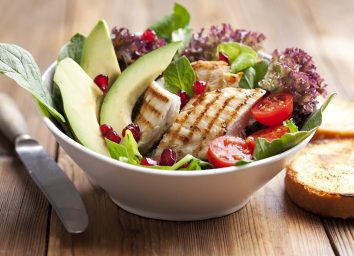Military Diet: A Registered Dietitian Explains How It Works and What to Eat

We’ve all known someone who’s gone off to boot camp and come back significantly slimmer and trimmer—which is probably the appeal of the military diet. This eating plan (which, by the way, has no affiliation with the U.S. military or any other country’s armed forces) is a calorie reduction diet that cycles through “on” and “off” days to achieve weight loss. According to proponents, you can expect to lose 10 pounds in one week on the military diet, without strenuous exercise or prescription pills.
With these dramatic claims, you may be wondering: Is the military diet a healthy way to lose weight? Does it actually work—and, more importantly, is it even safe? We dug into the details of this trend and spoke to a nutrition expert to find out. Here’s a look at what the military diet entails, plus answers about whether it’s a good idea for weight loss.
What is the military diet?
The military diet is set up in a weekly pattern intended to last seven days at a time. First, true to its authoritarian name, the diet outlines exactly what to eat for three days straight, down to the last tablespoon of peanut butter. The idea goes that the combinations of foods on the diet are tailor-made for boosting metabolism. This pre-set menu provides approximately 1,400 calories on the first day, then diminishes to around 1,200 and 1,100 calories over days two and three. The diet’s website also offers a number of substitutions if there’s anything in the three days you’re adverse to, as well as a vegetarian version for non-meat-eaters.
Three days “on” and four days “off”
Once you’ve completed days one through three, it’s on to the remainder of your military diet week: your four days “off.” Though you could use these days to indulge after 72 hours of restriction, the diet recommends sticking to its 1,500 calorie plan for best results. Then, repeat the three-days-on, four-days-off cycle for as many weeks as you like.
A typical 3-day military diet meal plan
This is an example of a 3-day military diet meal plan during those “on” days.
Day 1
Breakfast
1/2 grapefruit
1 slice of toast
2 tablespoons of peanut butter
1 cup coffee or tea (with caffeine)
Lunch
1/2 cup of tuna
1 slice of toast
1 cup coffee or tea (with caffeine)
Dinner
3 ounces of any type of meat
1 cup of green beans
1/2 banana
1 small apple
1 cup of vanilla ice cream
Day 2
Breakfast
1 egg
1 slice of toast
1/2 banana
Lunch
1 cup of cottage cheese
1 hard-boiled egg
5 saltine crackers
Dinner
2 hot dogs (without bun)
1 cup of broccoli
1/2 cup of carrots
1/2 banana
1/2 cup of vanilla ice cream
DAY 3
Breakfast
5 saltine crackers
1 slice of cheddar cheese
1 small apple
Lunch
1 hard-boiled egg (or cooked however you like)
1 slice of toast
Dinner
1 cup of tuna
1/2 banana
1 cup of vanilla ice cream
Does it work?
When it comes to weight loss plans, calorie restriction is certainly nothing new. Drastically reducing the amount of food you eat is, for most people, a surefire way to get the numbers on the scale to budge. However, though sometimes weight loss seems as simple as a calories-in, calories-out equation, it’s really a very complex process that depends on a variety of factors. The ability to shed 10 pounds in a single week will vary from person to person. Besides, limiting your intake for just three days–especially if those three days are followed by four days of catch-up from hunger–isn’t necessarily a formula for a 10-pound drop.
If calorie restriction only takes you so far, what about the military diet’s combination of foods intended to boost metabolism? Can mixing and matching certain menu items really help you shed pounds faster? “Research on specific food combinations boosting metabolism is limited,” says dietitian Alyssa Pike, RD, of the International Food Information Council. “Some research has demonstrated that caffeine, higher protein diets, and spicy foods may slightly boost metabolism.” The military diet’s menu relies on the caffeine in coffee and tea to ramp up metabolism on day one, but it’s not particularly high-protein (especially by day three), nor do any of the “on” days contain spicy foods. And even if you chugged coffee alongside crackers slathered in horseradish, the effects of these foods on weight loss are likely modest at best.
Drawbacks of the military diet
If you do experience weight loss on the military diet—and, with its strict limitation of calories, it’s likely you will—it’s best to keep in mind that eating this way is not a long-term solution. “The military diet may help you (temporarily) lose weight, but the odds of it staying off are slim,” says Pike. This is true for two reasons. First, when calories are limited, the body dips into its stores of glycogen, releasing water. “Once our glycogen stores are depleted (which happens during severe restriction), rapid loss of water weight can occur,” Pike notes. “Once you refill the deficit, that weight will likely quickly come back.”
Secondly, although the military diet’s website claims that “starvation mode” is a myth, many experts beg to differ. Limiting calories for a lengthy stretch has been shown to slow metabolism and make us hungrier. So while you may be able to sustain the military diet for a brief period, eventually its restrictive nature may cause your weight loss to plateau—and your hunger to override your ability to stick with its small portions. “It’s not because you’ve failed,” encourages Pike. “It’s your body’s basic survival mechanism.”
In addition to these caveats, jumping on a crash diet bandwagon can have mental or emotional consequences. “Restrictive diets can damage your relationship with food,” says Pike. “Food is rooted in tradition, joy, and satisfaction. Restriction often leads to an unhealthy preoccupation with food, weight cycling, anxiety around eating, interference with social events and mealtimes, and an increased risk for eating disorders.”
So should you try the military diet?
If you only follow the military diet for a single cycle of three days on and four days off, you’re not likely to inflict long-term damage on your body (or your psyche). But you may not actually lose that much weight, either. For those looking to significantly slim down, the standard advice may sound boring, but it’s true: Slow and steady usually wins the race. Many experts advise a target loss of one to two pounds per week, focusing on lean protein, whole grains, fruits, and vegetables—not specific combinations of metabolism-boosting foods. On a more sustainable regime, you can keep up your weight loss long-term, without having to join the ranks of the militant.








